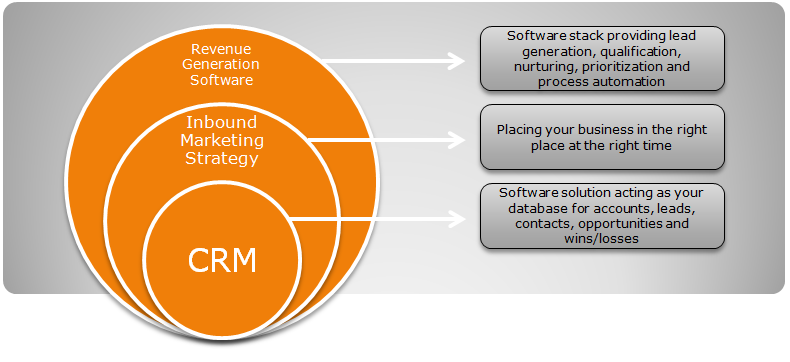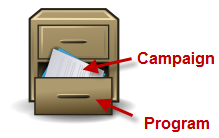This document discusses basic terminology used across Lead Liaison. It covers Programs, Campaigns, Lead Sources and compares these components to other components you might be familiar with. A comparison of the revenue cycle to the standard sales cycle and known leads to unknown leads is also provided.
Revenue Generation Software® is a sales, marketing and executive solution that helps your business generate, accelerate and measure revenue across all phases of the revenue cycle. Revenue Generation Software® is a platform, not a feature or product. Revenue Generation Software® includes the following core capabilities:
Three key components typically exist in a business marketing system, Revenue Generation Software® (RGS) being one of them. A CRM system, such as Salesforce.com, typically sits at the core of any business. A CRM is typically used and perceived as a large database to keep track of accounts, leads, contacts and opportunity wins/losses. CRM reporting typically provides a snapshot in time of business data.
The second component of a business marketing system is an inbound marketing solution/strategy. Inbound marketing is the process of placing your business in the right place at the right time. Facebook, Twitter, LinkedIn, blogging, landing pages and more are all examples of inbound marketing strategies. The concept is to know where your buyers "hang out" and how they research so you can get your business in front of your buyers, and be there when they're ready to take the next step.
The third component is RGS which provides operational advantages for your business. It helps to automate typical sales and marketing processes that historically took time to do manually. It's important to note that a CRM system and RGS are not the same. They are not competitive technologies, they are complimentary technologies. A CRM provides great tracking, storage and static views whereas RGS provides dynamic views and establishes sales and marketing processes, procedures and key operations that give businesses a competitive advantage in their marketplace.

A Known Prospect in Lead Liaison is someone with an email address. An Unknown Prospect is someone who does not have an email address. An email address is the unique identifier used in Lead Liaison. No two Prospects will have the same email address in the system.
Lead Liaison uses a concept of Programs and Campaigns to organize and create marketing activities. A Program is a collection of Campaigns. The Program/Campaign concept is similar to a file cabinet. The drawer of a file cabinet would be your Program whereas the file(s) in the drawer would be the Campaign(s). Marketers first create a Program, give it a name, then add Campaigns to their Program.
Campaigns are individual marketing events such as an email campaign, webinar or trade show. Lead Liaison helps marketers build multiple different types of campaigns. See "Types of Campaigns" below for a list of possible Campaigns that can be created. When creating an asset, such as an email, trackable content, web form, etc. assign the asset to your Campaign. Start creating Programs and Campaigns by clicking the new button on the top once you've logged into Lead Liaison.

Lead Liaison automatically assigns (tags) all leads with a lead source when possible. It is important not to confuse a Lead Source with a Campaign. Here's a short comparison chart to help you understand the difference between a Lead Source and a Campaign:
Feature | Lead Source | Campaigns |
|---|---|---|
Tracks leads from many places | YES | NO |
Designed to track what marketing is doing well | YES | NO |
Refers to all possible ways you receive an inquiry | YES | NO |
Helps calculate cost of acquiring new leads/customers | NO | YES |
Designed to track effectiveness of marketing programs around products/services | NO | YES |
Usually has a budget associated with the event | NO | YES |
Lead sources tell you the source of a lead and does not provide information about the expense/cost spent; however, a campaign can help you with more detailed information about the source. Leads can come from many places and a Lead Source refers to all possible ways you receive an inquiry - a phone call, an e-mail inquiry from our web site, a referral from an existing customer or a reply to a specific marketing campaign. For example, one of your customers might tell someone about your product or service at which time the new prospect contacts you directly. Your sales person would likely add "Customer referral" as the Lead Source in their CRM. Similarly, one of your salespeople may be using a list to cold call prospects until they find a hot lead. Your sales person would likely add the name of the cold calling list as the Lead Source. Some companies like to track the source of new leads so that they can understand what aspects of marketing is doing well and what aspects of marketing they need to improve on.
A Campaign is a specific initiative designed to market your company's product and/or service. It could be something as simple as a single direct mailer you send to an existing lead, existing customer or a list of people. Alternatively, a collection of Campaigns can comprise a multi-step Program of webinars, email messages, or direct mail with different materials sent out at specific time intervals. Campaigns usually have a budget and companies track which contacts have been influenced by their marketing campaigns to measure return on the investment for each campaign. By doing so, companies can evaluate which campaign elements are most effective and adjust them as necessary.
For more information on Lead Liaison's lead source tagging process reference this wiki page.
For more information on Programs and Campaigns reference this wiki page.
References |